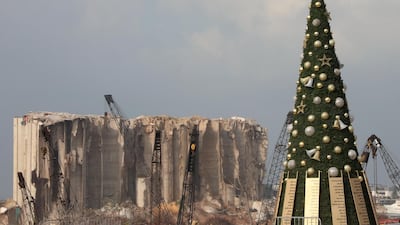Today marks the anniversary of a story that began 2,020 years ago in the Palestinian town of Bethlehem. It was a very different Middle East from the one we live in this Christmas. But the communities, in Palestine and throughout the region, who are inspired by the birth and life of Jesus endure.
This year, they have endured a great deal. Bethlehem suffers from a lack of tourists and pilgrims due to Covid-19 and continued Israeli occupation. In the twin Levantine capitals of Damascus and Beirut, economic crisis has cast huge numbers of citizens into poverty. In the former, the proximate cause is an ongoing civil war. In the latter, it is a failure by state institutions trapped in the swamp of sectarianism to govern effectively.
A Christmas tree erected last week in Beirut, which has the largest Christian population of any Arab capital, bears the names of victims of an explosion of a store of ammonium nitrate in August. The blast killed nearly 200 people, and injured more than 6,500 others. The city’s historic Christian quarter along with several churches and hospitals were left in ruins.
Iraq’s Christians, who have seen their population plunge from 1.5 million to 400,000 in the past two decades, have seen other hardships. One is the struggle to revive the city of Mosul. Once a paragon of diversity and co-existence, it was emptied of its entire Christian community when the terrorist group ISIS invaded in 2014. Mosul is back in government hands now, but barely 100 Christians have returned, citing a lack of jobs or other prospects until it is rebuilt.
Elsewhere in the Middle East, Christmas is rendered more difficult not by war and politics, but by circumstance. A chance mutation in the coronavirus caused the sudden closure of international borders in Saudi Arabia, Oman, Kuwait and Israel this week. Hopes for many who live and work in these countries of spending Christmas with loved ones abroad have been dashed.
In Jordan, home to 600,000 Christians, a weekly total lockdown has been enforced every Friday since September, including today. In Egypt, where the mutant strain has already been detected, a surge of infections has resulted in the government banning New Year’s Eve celebrations. The country’s Coptic Christians, who along with Orthodox communities celebrate Christmas on January 7, worry that the situation will not ease before then.
The story of Jesus, however, for Christians and Muslims alike, has always been one of hope. And there is much to be hopeful for in the Middle East this Christmas.
Beirut’s houses of worship were rebuilt after devastating wars in previous decades, and they will be rebuilt now as the city’s residents find solidarity with one another amid a growing popular movement for change. In Mosul, the rebuilding has already begun, with the UAE having partnered with Unesco to restore its ancient Al Tahera and Al Sa'ah churches. Mosul will also be on the itinerary of Pope Francis when he undertakes an historic visit to Iraq in March.
And as Prof Ugur Sahin, the scientist behind the Pfizer-BioNTech coronavirus vaccine, told The National this week, he is highly confident that the inoculation will prove effective against the new mutation. As vaccines are adopted around the region, everyone will be better off.
On Monday, the UN General Assembly adopted Resolution 75/200, declaring February 4 to be an International Day of Human Fraternity. Inspired by the signing of the Human Fraternity Document by Pope Francis and Dr Ahmed Al Tayyeb, Grand Imam of Al Azhar Mosque, in Abu Dhabi in 2019, the UN’s member states hope that the day will be an opportunity to promote tolerance and religious expression, and to end religious discrimination. It is a worthy mission to bear in mind this Christmas, and in all of the Christmases to come.






































